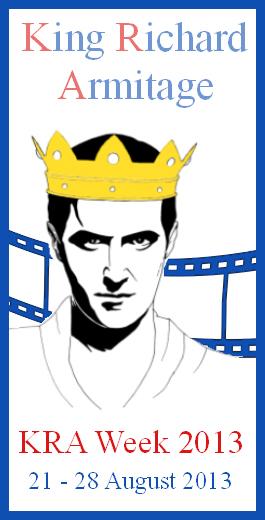KRA Week 2013-3: History & Law – Author Matthew Lewis
Links: King Richard Week 2013 & Quiz
♕ ♛ ♕
Interview with author Matt Lewis
about
his research & King Richard III
First of all, I need to confess, having such a knowledgeable author and researcher as interview partner let my curiosity run away with me. I hope you will enjoy the wonderful and insightful answers by author Matt Lewis.
Matt Lewis also currently publishes a series of articles in defence of King Richard III on the Royal Central blog
- The Real White Queen? A Defence Of King Richard III (02.08.2013)
- The Defence of Richard III Part 2 – The Foundations of Evil (06.08.2013)
- The Defence of Richard III Part 3 – To Kill A King (11.08.2013)
- The Defence of King Richard III Part 4 – Bosworth, Shakespeare & That Horse (22.08.2013)
and an interview by Karen Kilrow with more background was published there (13.07.2013).
But now to the interview and my curious questions:
Can you tell us a bit about yourself and your historical background?
I have been passionate about history since school, where it was my favourite subject. I studied the Wars of the Roses there and it immediately grabbed me. The intricacies of the family ties, the loyalties and the betrayals are like the plot of the most complex tv series you ever watched, only this was real people’s lives being torn apart.
The story of Richard III was also something I was immediately fascinated by. The difference in his reputation before 1483 and after was so diametrically opposed that it just didn’t make sense. I had to learn more! An interest became a passion. I read book after book about the Wars of the Roses and Richard III and the more I read the more convinced I became that something was amiss.
How does your legal background fit into your interest for history?
At university I studied law and even that seemed to complement the study of history. I find that having a law degree complements an interest in history very well. A solicitor I worked for once told me that no one knows all of the law, the trick is knowing how and where to find what you need. This principle applies to history too. No-one knows all of history.
The skills of research are the same. A law degree teaches you how to find facts, examine and understand them from all angles, to view things from the perspective of others and then present your findings. Historical research is identical. When writing fiction, legal training helps further because it teaches you to understand the facts and then make them prove what you need them to prove!
Why is it so difficult to get unbiased research into the life and times of Richard III, even more than 500 years after his death?
It is hard to understand why Richard III doesn’t get the kind of impartial study almost anyone else does. I think it is due in part to history, for purposes other than academic study, liking to box people up neatly as ‘goodies’ and ‘baddies’. The Tudors followed Richard and were keen to present a picture of an England ravaged by tyranny from which they saved a grateful people. Obviously he was then maligned by Shakespeare and that image of him stuck. There has always been a core of historians keen to shine the light of fact on his reputation but it has been hard to fight against a presumed, accepted image. Because of this the argument becomes more polarized as some believe him an evil tyrant and others try to paint him as a saint. Somewhere in the middle the real man is lost. He was neither a saint nor a demon and until the argument moves away from such passionate polarization it will always prove hard to judge him dispassionately.
Might this difficulty to get some resemblance of ‘justice’ for a historical figure have something to do with the current royal family descending from those getting into power after the Battle of Bosworth or the perception of a need to legitimize the later religious separation from Rome or have something to do with a modern interpretation of what monarchy and democracy should be or do?
I think that the present royal family have little impact on the study of the history of personality. They would, I suppose, have a vested interest in the institution of monarchy and so would not wish to become embroiled in any kind of discussion of rights and wrongs. To do so opens them up for such criticism in the future. It is for this reason, I suspect, that the royal family is not keen to allow the opening of the urn in Westminster that supposedly contains the remains of the Princes in the Tower and of other royal tombs such as Edward IV’s for DNA comparison. I doubt that it relates to insecurity or rivalry but rather to the sanctity of those graves. There are human beings resting in peace there. If permission were given now, the same could happen in the future to those still alive now and they may well not want that. Whatever the rights and wrongs of Bosworth, Henry VII was anointed king, whether by right of blood or conquest becomes irrelevant. No-one could challenge the legitimacy of the current royal family now on that basis. If we look further back, Edward IV took the throne by force, as did Henry IV. Do we then head back to William the Conqueror?
Will finding the ‘real’ King Richard III now help with the research to also start the search for the ‘real’ person, not the legend?
The discovery of Richard III’s grave is an opportunity that I hope will be exploited to the full by those seeking a re-evaluation of his reputation. I noticed a real surge in sales of my novel when it was announced, so clearly interest has been captured and just needs to be exploited. The White Queen series has drawn attention to the Wars of the Roses period too. Visitors are pouring in to the exhibition at Leicester and I hope that they will be taking away a different perspective on him, if they are not already Ricardians! I was lucky enough to visit the dig site at Greyfriars on one of the open days and it sent a chill down my spine to think that I could be standing so close to the remains of a man I had studied for so long. I was like a crazed fan. I find it amazing that after everything that has happened on that site – the demolition of the monastery, the building of the mayor’s house and gardens, the demolition of that and all of the subsequent Victorian work, not to mention the laying of the car park – that his grave remained intact and unspoiled, missed by every pick axe and digger that had been on the site. His funeral will be another huge event, unlike anything we have seen before. It would be fantastic to make it there and I will be doing my best to attend some part of it.
I hesitated a bit with the following question, not wanting to heat up the brewing battle. But Matt Lewis answered my question about King Richard III’s last resting place with grace and historical knowledge, so I need not have worried:
With all the discussion about the ‘Battle of the Cities’, what is your position regarding the fighting towns York and Leicester?
In terms of where he should be laid to rest, I have no issue giving my preference. From the very outset there has only been one place that I believe he should be buried and that is Westminster Abbey. He was a king of England and deserves no less. Much has been made of Leicester’s right to him and York’s desire for him. Indeed, it has been claimed that he wanted to be buried at York Minster. Whilst he was lord of the north for his brother this may have been his intention but by the time that he died he was King of England. The clearest indication of his final wishes is the fact that he had his wife buried at Westminster. He may well have intended to have their son moved there from Middleham too, but I think Anne’s presence at Westminster tells us all that we need to know about his wishes.
How do you see the legal aspects of the appeal by the relatives of King Richard III, the Plantagenet Alliance?
The legal challenge that has been brought is flawed in so far as those bringing it are not descendants of Richard III, they are descended from his siblings. It is also my understanding that the reburial of remains discovered during an archaeological dig does not require consultation with the relatives where the remains are over 100 years old, as those of King Richard clearly are. Best practice is to have remains interred at the nearest church or cathedral to the location they were discovered too. Leicester University appear to have done all that was required of them and I suspect that their wish to have him buried at Leicester Cathedral will be, in the end, granted.
You wrote a historical novel about Richard III, clearly depicting Richard III as human being, not the caricature not only Shakespeare, but also some historians made and still make him.
What is your reason to do so and where do you see you have to add to all the previous works and novels about Richard III?
I wrote my novel as an indulgence really. It took about 10 years of picking it up and putting it down but I enjoyed writing and researching it. I tried to remain as historically accurate as possible, not least because the true story is far too interesting to have to invent anything! The book looks at the more domestic side of Richard’s life from the Battle of Barnet when he helped his brother Edward IV regain his throne to Bosworth. Most people know about the battles he fought, the seizure of the throne, the Princes in the Tower and the Battle of Bosworth but I wanted to explore him as a more rounded person, at home with his wife, relaxed with his friends, but still dealing with huge issues of national importance. ‘My’ Richard has faults, too. He is far from perfect. His temper is short and his inability to understand those who do not share his views leave him politically naive and exposed. The actions that he takes in the book broadly follow the known history, so if he attracts sympathy for his actions, it is because he deserves it.
Whatever you decide about him by the end, at least it will be based on fact rather than accumulated mythology.
Studying law helps to view things dispassionately, to detach from them and present them objectively. I am an ardent Ricardian, though I don’t necessarily belief he was without fault. I hope that by presenting a man trying his hardest to make his way in a hostile, uncertain world, struggling to protect his family, I could balance out the saint v tyrant argument a little.
To what extent is your work “Loyalty” based on the research by Jack Leslau about the image interpretation and connection between Sir Thomas More and Hans Hobein? (Research presented on the website: www.holbeinartworks.org)
I first read a brief reference to Jack Leslau’s work in A.J. Pollard’s King Richard III and the Princes in the Tower. It fascinated me and I read more. The more I learned the more interesting it became. In the end it provided the frame through which Richard’s story is told, so there is no doubt that it influenced me a great deal. Ricardians will probably know what that means for the story, but it is not well discussed beyond this. The sequel, which is nearing completion, follows both threads of this story to something which I believe is entirely new. At least I have never come across my next theory before! Holbein returns and we also follow the aftermath of Bosworth as those loyal to Richard who survive try to find a place for themselves in a changed world, a world that hunts them.
You wrote two further works about King Richard III and the Wars of the Roses. Both are rather short volumes with highly condensed information, giving an excellent overview of events and happenings.
What was your reason to write those and for which audience are they intended?
I have begun a series of brief factual history books offering my take on the period I love. A Glimpse of King Richard III was born of the new interest in the king and is a very short biography. It is aimed squarely at those interested in the subject because of the recent discoveries and discussions but who do not wish to dive into a weight biography – though I enjoy these immensely, they are not for everyone. I thought those with a casual interest might pick it up and hopefully put it down with a different perspective on King Richard III. A Glimpse of the Wars of the Roses adds depth to the subject but is also brief, beginning with the roots of the conflict and then following the chronology of the politics and the battles. Again, with interest high and The White Queen drawing much attention, I thought some with a more casual interest in the period might find it interesting. There is more to come in the series too. Hopefully people will enjoy my lighter take on the complexities of the period.
Book publications currently available by Matthew Lewis on Amazon.com / Amazon.co.uk
:
* * *
* * *
* * *
Links: King Richard Week 2013 & Quiz







Pingback: KRA-Week 2013-4: Peter Warzynski & Leicester | King Richard Armitage
Pingback: Celebrating 2.000 Signatures | King Richard Armitage